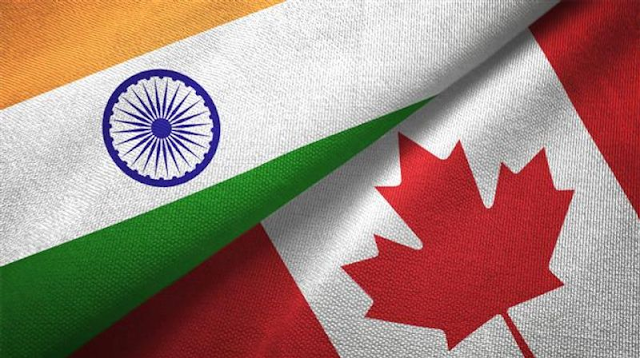In a significant diplomatic row, India has accused Canada of harassing its diplomatic staff, leading to a further deterioration of relations between the two nations. The escalating tensions have reached a point where India has been placed on Canada’s list of “enemy countries,” alongside North Korea and Iran, raising serious concerns about the future of bilateral ties.
Background of the Diplomatic Crisis and Cybersecurity Concerns
The friction between India and Canada has been building over recent months, with the diplomatic crisis intensifying after Canadian Prime Minister Justin Trudeau’s government designated India as a potential cyber threat. In Canada’s “National Cyber Threat Assessment 2025-26,” India was labeled as one of the countries perceived to be a significant cybersecurity threat, comparable to adversarial states. The report claims that India’s rapid modernization of its cyber programs could potentially target Canadian interests, alleging risks of espionage and cyber intrusions.
India’s Ministry of External Affairs responded vehemently, dismissing these accusations as baseless and politically motivated. Officials in India argue that Canada has repeatedly attempted to damage India’s global reputation, with the cybersecurity claims viewed as the latest instance in a string of provocations. Canada has previously voiced concerns about India’s actions without presenting solid evidence, leading to suspicions in India that Canada is using this narrative to further an anti-India agenda on the international stage.
🇨🇦 Canada’s Cyber Defence Agency Labels India a Threat in New Report
🇮🇳 has been listed for the first time by the Canadian agency CSE, stating “state-sponsored cyber threat actors” LIKELY conduct espionage activities against Ottawa.
The National Cyber Threat Assessment report… pic.twitter.com/a9Rf9AKCGQ
— RT_India (@RT_India_news) October 31, 2024
Allegations of Harassment
Adding fuel to the fire, India’s Ministry of External Affairs recently accused Canadian authorities of violating diplomatic norms by allegedly subjecting Indian diplomatic staff to harassment and intimidation. Senior Canadian officials have reportedly acknowledged intentions to discredit India internationally, escalating tensions between the two countries. India’s diplomatic personnel in Canada reportedly face constant surveillance and undue scrutiny, which India argues undermines diplomatic immunity and established protocols.
The allegations took a further turn when Canadian Deputy Foreign Minister David Morrison publicly accused India’s Home Minister, Amit Shah, of directing actions against pro-Khalistani extremists within Canada. India dismissed these allegations as groundless, emphasizing that Canada has yet to provide any substantial evidence to support such serious claims. The Indian government formally expressed its objections by summoning Canadian representatives to deliver a strong protest.
🚨 HUGE. Canada ACCUSES 🇮🇳 Home Minister Amit Shah.
Canadian Deputy foreign Minister says “Amit Shah AUTHORISED violent operations targeting Khalistanis in Canada.”
– This statement will BACKFIRE Canada only & will boost Modi govt’s image in India 🎯pic.twitter.com/28y5t1VK13
— Megh Updates 🚨™ (@MeghUpdates) October 30, 2024
BREAKING: INDIA THREATENS CANADA WITH SERIOUS CONSEQUENCES AFTER HOME MINISTER AMIT SHAH ACCUSED OF POLITICAL INTERFERENCE BY CANADIAN AUTHORITIES pic.twitter.com/mPz8mGhjEE
— Shashank Mattoo 🇮🇳 (@MattooShashank) November 2, 2024
Consequences and Implications
This diplomatic standoff could have lasting impacts on Indo-Canadian relations, affecting not only political ties but also economic and cultural exchanges. As both nations maintain firm positions, the possibility of reconciliation seems uncertain, with broader implications for international relations.
In the meantime, the Indian government has emphasized that its diplomats operate under a hostile environment in Canada, raising concerns about their safety and ability to perform diplomatic functions. The international community is closely monitoring the situation, aware of the potential ramifications on global diplomatic dynamics.
Conclusion
The escalating exchange of accusations between India and Canada represents a serious challenge to bilateral ties. With both nations standing their ground, diplomatic dialogue will be essential in de-escalating tensions, but achieving meaningful progress may be difficult given the current climate of distrust. The road ahead remains fraught with complexities, as each side weighs the consequences of further escalation or potential compromise.
Suggested Readings
Gurpatwant Singh Pannu’s Latest Threat: Calls for India’s Balkanization Amid International Tensions
Trudeau Lacks Evidence Against India | Pannun Seeks to Incite Hatred Towards Indians
Canada’s Shift in Stance Towards India: Analyzing the Recent Developments
India-Canada Relations on the Brink: India Recalls High Commissioner Amid Diplomatic Crisis
Canada’s Accusations Against India: Where’s the Evidence?
Canada accuses India of using Bishnoi Gang for targeting Khalistanis
Diplomatic Clash with Canada: India May Opt for TATA WhAP Over Stryker Armored Vehicles
India Hits Back at Canada Amid Strained Diplomatic Tensions
Indian High Commissioner to Canada Responds to Allegations in CTV News Interview
Canada’s Intelligence Leak Puts Diplomatic Relations with India at Stake





